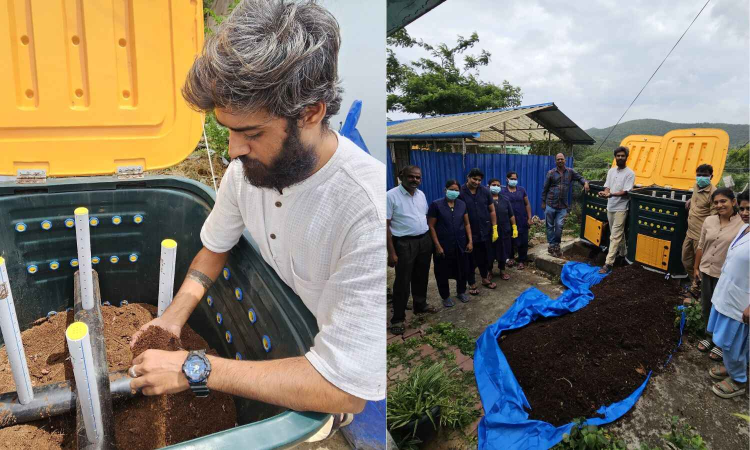From trash to transformation: How Nilayaan is rethinking waste in Chennai
The team’s work is grounded in a straightforward idea: decentralise waste management.

Nilayaan works closely with apartments and corporates in waste segregation
CHENNAI: Walk through almost any street in Chennai, and you’ll find overflowing bins, a familiar sight that reflects a much deeper crisis. Mounting waste and mismanaged disposal have become a daily challenge for the city. But while most people walk past the problem, Deepesh Bhaskar decided to act. That decision gave rise to Nilayaan, an environmental startup that’s slowly but surely changing the way Chennai thinks about its waste.
“When I started Nilayaan, the goal was simple. To make sure waste doesn’t just end up in landfills, we wanted to compost it, treat it as a resource rather than a problem,” Deepesh says. Nilayaan, which takes its name from the Tamil word 'Nilayana' meaning sustainable, is all about incorporating sustainability into everyday life. “We work to turn waste into value and help individuals and communities take climate action,” he says.
The team’s work is grounded in a straightforward idea: decentralise waste management. “We partner with apartments, corporates, industries, and even communities in tribal regions like Attapadi, where we’ve implemented composting-based waste projects,” Deepesh shares. Their primary focus is food waste - converting kitchen scraps and leftovers into nutrient-rich compost. It’s practical, cost-effective, and, most importantly, keeps tons of waste out of landfills.
But Nilayaan isn’t just about composting. They’re also leading the charge in minimal-waste event planning, which is becoming increasingly popular among eco-conscious organisers. “Before every event, we analyse what types of waste are likely to be generated and provide alternatives. If an event would normally rely on plastic water bottles, we offer two solutions: refill stations, so guests can reuse their bottles, or compostable bagasse cups. That way, nothing ends up in the landfill,” he explains.
One of their biggest success stories? A recent two-day wedding attended by over 12,000 people. “It was a massive event, but not a single piece of food went to waste. We partnered with No Food Waste, a local organisation that collects and distributes excess food to those in need.”
The team also hosts interactive workshops and seminars tailored for different age groups. For children, they conduct creative compost-art sessions. For college students, they offer workshops on composting techniques and the link between waste and climate change. “We’ve taken our model to many places. People who are conscious about the waste they generate reach out to us and that’s how change begins,” Deepesh says.
At the core of Nilayaan’s philosophy is segregation and decentralisation. According to Deepesh, this is the only way Chennai or any city can handle the ever-growing waste crisis. “Look at the average household. About 60 to 70 per cent of waste is organic, vegetable peels, fruit waste and cooked food. Around 20 per cent is recyclable materials like paper, plastic and glass. The remaining 10 per cent is rejected waste like sanitary napkins, diapers, or medicines. If we mandate segregation and give people the tools and knowledge to compost their organic waste at home or in their community, the burden on municipal systems would be reduced drastically. You’d only be handing over dry recyclables to sanitation workers. Wet waste, the hardest to manage, would be handled right at the source.”
He imagines a future where every street has its community composter and where institutions, restaurants, apartments and industries take full responsibility for the waste they generate. “It’s the only way forward. If the government, the public and private players come together, we can make sustainable living the norm, not the exception,” he says firmly.



